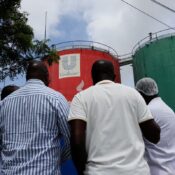
Karuma power plant finally goes online after 11 years off work
Uganda’s largest hydroelectric project, Karuma, was finally put into service on Thursday after 11 years of construction. This marked the end of a convoluted and lengthy trip fraught with technical issues, disputes between the contractor and the government, and other non-engineering difficulties.
In December 2013, work on the tunnel-design power plant, an interconnection station, and high-voltage transmission lines began. The total cost of the project was $1.688 billion, of which $1.435 billion came from a loan from China Exim Bank and the other $1.688 billion came from the energy fund of the Ugandan government.
With a maximum output of 600 MW, Karuma has increased Uganda’s installed capacity to little over 2,000 MW, from 380 MW in 2005. The majority of the energy produced by Karuma is hydroelectricity, a combination of solar, hydro, and thermal sources.
The power plant was put into service by President Yoweri Museveni. At 4.97 US cents per kWh, it is the least expensive power plant in terms of cost, ranking fourth behind Nalubaale (1.119 US cents), Kiira (1.19 US cents), and Isimba (1.46 US cents). Bujagali is the most expensive, costing 8.30 US cents per unit.
“A modern economy requires access to reasonably priced, dependable electricity. High power costs would hold us behind, President Museveni declared, clarifying that he did not agree with an independent power producer from Norway who approached Kampala in the 1990s and suggested that the maximum dam size at Karuma Falls be built at 200 MW.
“I informed them that I know someone who has a superior concept. I departed from the Norwegians in this way. When the Chinese entered, I suggested that they build a tunnel and use the water’s force to generate more electricity. He clarified, “The Chinese came in and they said we can do it, but they can co-fund it.
Even though Karuma is celebrating the completion of its latest project, which will increase Uganda’s capacity to generate electricity, there are still unresolved concerns to be resolved. At least 21 families who were uprooted by the power dam, which covers 4.6 square kilometers, have not yet been relocated.
“Complete relocation of project impacted individuals is still pending,” stated Energy Minister Ruth Nankabirwa during the project’s inauguration. According to the study on the resettlement action plan, 414 households will be impacted. Ninety-five percent of the way there, but some are still seeking civil actions.
President Museveni offered to purchase building supplies for the displaced people, but he was informed that the problem goes beyond shelter and also involves the environment because the area where the project’s impacted people are to be relocated may spark hostilities between people and wildlife.
We can construct our own homes if we get the necessary materials, but we are afraid that the environmental impact assessment was not done properly because the area is home to many elephants! One woman who was displaced commented, “It’s close to the national park.”
Finding fissures
The project faced significant technical challenges within the first two years, with the engineer finding cracks in the spillway concrete works, which forced Chinese contractor Sinohydro Corporation to halt construction for weeks. The project was initially expected to be completed within the 60-month contract period.
A group of Sinohydro specialists acknowledged flaws in the concrete installation at the Karuma hydropower plant in May 2016 and decided that the contractor should seal the fissures, which would not affect the mega dam’s overall performance.
President Museveni appointed a project steering committee (PSC) to oversee the contractors after similar flaws at Isimba, an 183 MW hydropower plant being built upstream of Karuma, were found to be endangering the dams’ projected completion dates.
The travel industry came to a complete stop because to Covid-19, which also delayed Sinohydro’s intentions to bring in engineers from China for work on the plant’s powerhouse.
Even after the travel restrictions related to the pandemic were lifted in October 2021, Karuma would experience a string of further delays as it became apparent that the power plant had electrical-mechanical system non-conformities, which Sinohydro began fixing in March 2022 and were a source of disagreement between the Chinese company and the government.
Officials discussed several matters during the dam’s commissioning, but they refrained from mentioning the technical flaws that caused tensions between government representatives and Sinohydro engineers during the course of the dam’s 11-year construction.
The former PSC chairman, Dr. Badru Kiggundu, stated, “We faced so many challenges.” “Vandalism is the challenge I wish to present. Five towers fell in one night at one point. The components of the towers, which are imported from China, are too big for us to make. This delayed us by several months.
With Karuma’s opening, Uganda is exploring additional energy sources, such as geothermal and nuclear energy, which may increase the nation’s installed capacity to 52,481MW by 2040, according to Energy Permanent Secretary Irene Batebe.
“We haven’t settled because Karuma was commissioned. As a ministry, we are dedicated to guaranteeing national energy security, with the goal of reaching 52,000 MW by 2040. We are starting this today, and we will begin another one tomorrow,” she stated.
Uganda’s energy policy, which aims to invest in long-term power generation to satisfy future demand, authorized by Cabinet last year, sets a target of 24,000MW from nuclear energy alone, or roughly half of the country’s entire energy mix, with grid access at 80%.
The Ministry of Energy estimates that the construction of Uganda’s first nuclear facility, a 2,000 MW plant in Buyende, eastern Uganda, will cost $9 billion. Uganda and Korea Hydro and Nuclear Power Company Ltd signed a memorandum of understanding for the project last year.
Plans from the government also include for the construction of the 840 MW Ayago in northern Uganda.
All Categories
Recent Posts
Tags
+13162306000
zoneyetu@yahoo.com


